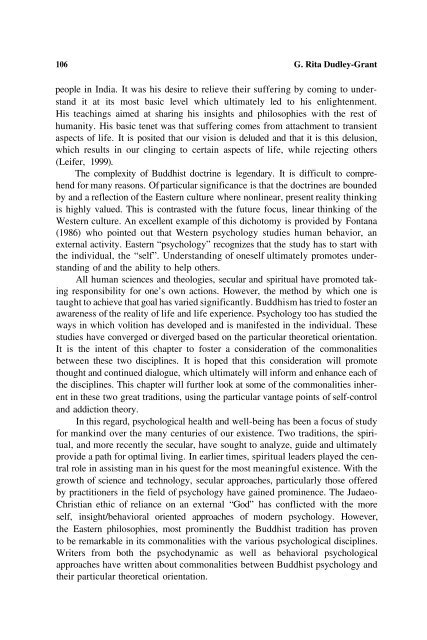Psychology & Buddhism.pdf
Psychology & Buddhism.pdf
Psychology & Buddhism.pdf
You also want an ePaper? Increase the reach of your titles
YUMPU automatically turns print PDFs into web optimized ePapers that Google loves.
106 G. Rita Dudley-Grant<br />
people in India. It was his desire to relieve their suffering by coming to understand<br />
it at its most basic level which ultimately led to his enlightenment.<br />
His teachings aimed at sharing his insights and philosophies with the rest of<br />
humanity. His basic tenet was that suffering comes from attachment to transient<br />
aspects of life. It is posited that our vision is deluded and that it is this delusion,<br />
which results in our clinging to certain aspects of life, while rejecting others<br />
(Leifer, 1999).<br />
The complexity of Buddhist doctrine is legendary. It is difficult to comprehend<br />
for many reasons. Of particular significance is that the doctrines are bounded<br />
by and a reflection of the Eastern culture where nonlinear, present reality thinking<br />
is highly valued. This is contrasted with the future focus, linear thinking of the<br />
Western culture. An excellent example of this dichotomy is provided by Fontana<br />
(1986) who pointed out that Western psychology studies human behavior, an<br />
external activity. Eastern “psychology” recognizes that the study has to start with<br />
the individual, the “self”. Understanding of oneself ultimately promotes understanding<br />
of and the ability to help others.<br />
All human sciences and theologies, secular and spiritual have promoted taking<br />
responsibility for one’s own actions. However, the method by which one is<br />
taught to achieve that goal has varied significantly. <strong>Buddhism</strong> has tried to foster an<br />
awareness of the reality of life and life experience. <strong>Psychology</strong> too has studied the<br />
ways in which volition has developed and is manifested in the individual. These<br />
studies have converged or diverged based on the particular theoretical orientation.<br />
It is the intent of this chapter to foster a consideration of the commonalities<br />
between these two disciplines. It is hoped that this consideration will promote<br />
thought and continued dialogue, which ultimately will inform and enhance each of<br />
the disciplines. This chapter will further look at some of the commonalities inherent<br />
in these two great traditions, using the particular vantage points of self-control<br />
and addiction theory.<br />
In this regard, psychological health and well-being has been a focus of study<br />
for mankind over the many centuries of our existence. Two traditions, the spiritual,<br />
and more recently the secular, have sought to analyze, guide and ultimately<br />
provide a path for optimal living. In earlier times, spiritual leaders played the central<br />
role in assisting man in his quest for the most meaningful existence. With the<br />
growth of science and technology, secular approaches, particularly those offered<br />
by practitioners in the field of psychology have gained prominence. The Judaeo-<br />
Christian ethic of reliance on an external “God” has conflicted with the more<br />
self, insight/behavioral oriented approaches of modern psychology. However,<br />
the Eastern philosophies, most prominently the Buddhist tradition has proven<br />
to be remarkable in its commonalities with the various psychological disciplines.<br />
Writers from both the psychodynamic as well as behavioral psychological<br />
approaches have written about commonalities between Buddhist psychology and<br />
their particular theoretical orientation.











